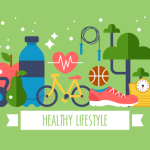
Coffee contains the most commonly used psychoactive drug in the world – caffeine.

A good old cup of Joe.
So those who drink it everyday – including myself and other Five Minutes Spare staff – will argue that it is good for you, because it certainly feels like it is in the morning!
But yes, surprisingly, coffee has some pretty nifty health benefits – meaning it’s not the worst thing to be addicted to!
It’s a fat burner.
Caffeine is in pretty much every weight loss supplement out there (and let’s be honest, they’re all the same just branded differently). But for good reason. Caffeine is one of the few substances that has actually been proven to aid weight loss. It has been proven to boost your metabolism by as much as 11%.
Despite this, these effects are said to be not as strong in long term coffee drinkers/caffeine consumers.
It contains vitamins and nutrients.
A single cup of coffee contains:
- Riboflavin (vitamin B2): 11% of the Reference Daily Intake (RDI).
- Pantothenic acid (vitamin B5): 6% of the RDI.
- Manganese and potassium: 3% of the RDI.
- Magnesium and niacin (vitamin B3): 2% of the RDI.
A few cups of coffee in a day, like a lot of people have, and these small looking percentages can build up.
May lower your risk of developing certain diseases.
Research has shown that coffee can prevent or at least partially prevent diseases like Parkinson’s, Alzheimer’s, and even type 2 diabetes.
For diabetics, the largest and arguably most accurate study of long term coffee drinkers are around 7% less likely to develop the disease, with some studies suggesting 30% less.
Parkinsons is a disease that is generally associated with later life, and is a neurodegenerative condition, like Alzheimer’s. Coffee has been shown to possibly reduce the risk of developing the disease by a minimum of 30% and a maximum of 60%, which is a very significant amount less than someone who doesn’t drink coffee. It seems the caffeine itself is the preventative here, as decaf drinkers don’t seem to have the same reduced risk.
The risk reduction for Alzheimer’s is the same too, with up to a 65% risk reduction.
So yes, there are a lot of health benefits of drinking coffee, and this article just scratches the surface. But, even with all these wonderful benefits, coffee has a few drawbacks, such as a temporary increase in blood pressure, and other digestive problems.





